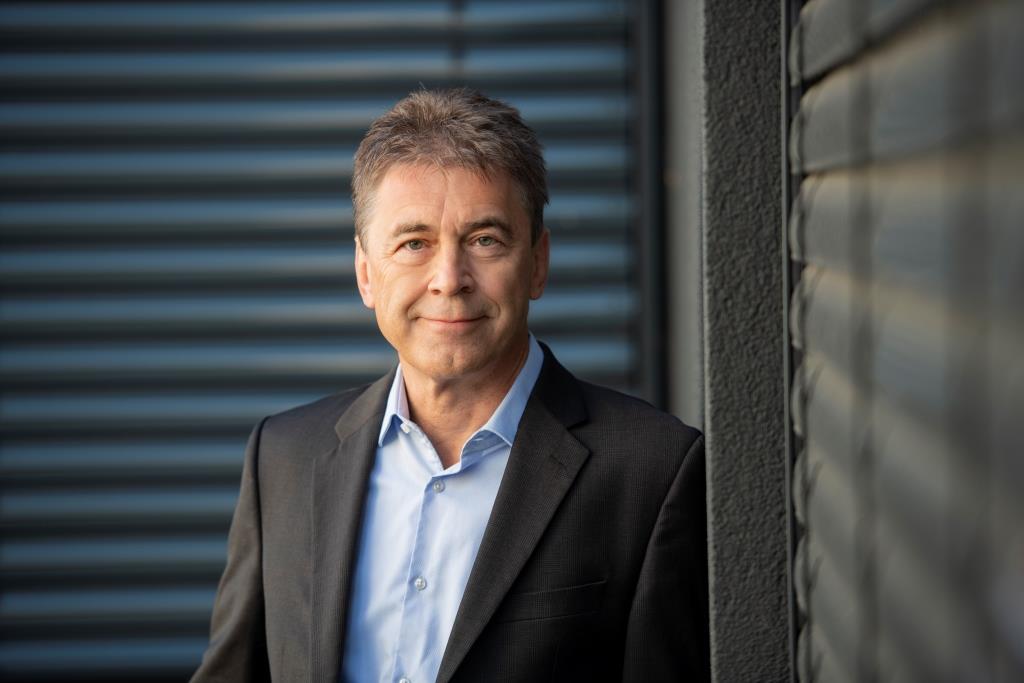Dr. Klaus Löser
ALD, Senior Vice President Heat Treatment
 We are very pleased to be able to offer you this interview with Dr. Klaus Löser, Senior Vice President, Heat Treatment, ALD. Dr. Löser talks about the company, future plans and changes within the industry.
We are very pleased to be able to offer you this interview with Dr. Klaus Löser, Senior Vice President, Heat Treatment, ALD. Dr. Löser talks about the company, future plans and changes within the industry.
Klaus, I really appreciate your time. We have known each other for many years, so having the opportunity to interview you is something I have been looking forward to. To begin, let’s start with your background. What is your doctorate in and how did you end up in the heat treating industry?
“Hi Gord, nice talking to you. I completed my university education at the Technical University of Darmstadt in Germany. After studying general mechanical engineering, I completed my doctorate at the Institute of Materials Science in Darmstadt. There I studied long-term component properties under high temperature stress, especially components for use in stationary gas and steam turbines, but also for applications in aviation. Already at that time I was concerned with the influence of heat treatment on the properties of components, especially nickel-based alloys. So it was obvious to apply the knowledge and findings gained in this field in my professional life.”
What is your role in the company?
“I gained my first professional experience as a development and process engineer in the industrial furnace division at Degussa AG, one of the predecessors of ALD Vacuum Technologies. After positions in sales in North America and Mexico I became head of research and development. Presently I am a senior vice president, in charge of the heat treatment division of ALD. In addition, I was head of the scientific advisory board of the Research Association for Industrial Furnaces Engineering for many years and actually I am serving as a member of the board of directors of the German heat treating association AWT.”
ALD is a very interesting company. One way it differs from many others in this industry is that you build both Thermal Processing Equipment and you also offer commercial heat treating. Could you give us some details about the company both on the equipment side and the heat treating services side?
“When we developed and introduced low-pressure carburizing and high-pressure gas quenching for high-volume applications in automotive industry in the 1990s, many customers were uncertain in dealing with this technology. The transition from atmosphere heat treatment with oil quench to vacuum technology with gas quench was a paradigm shift for them. This gave rise to the idea of giving these customers the opportunity to participate in the advantages of this technology in the form of a service, a real win-win situation for our customers and us. On the one hand they benefit from the longstanding heat treatment know-how of ALD and can therefore use the advantages of the new heat treatment technology. On the other hand they don´t have to pay the financial and technical hurdles that have to be overcome with the introduction of a new technology in their own plant. At the same time, our plant engineering and construction division also benefit from the service companies in that production experience and ideas for optimization flow back directly to our process and plant development.”
Klaus recently you made some changes in the structure of the company in North America, could you share with us what form this took?
“As part of a strategic realignment of our worldwide activities, we decided last year to combine our previously separate heat treatment and metallurgy activities and locations for the North American market at the East Windsor site in Connecticut. From there ALD Vacuum Technologies North America is responsible for over 100 installations of mission critical equipment in advanced heat treatment technologies, superalloy materials companies and special technologies in partnership with top OEM’s in aerospace and automotive. Since the merger of these companies in 2019 ALD North America has continued to expand their capabilities in customer support services and technical sales. They have increased the number of field service engineers and just recently our new sales & application engineer Andrew Chan joined our team to support our heat treat activities.”
Your heat treatment business, ALD TT (Thermal Treatment) is very unique in that it is so focused. What I mean by that is, most commercial heat treaters offer numerous different processes. However, that is not the case with ALD Thermal Treatment. Could you please elaborate why?
“This historically results from the idea to offer our customers a brand-new technology where a lot of process knowledge is available in ALD. Case-hardening is also a process that is mainly used in large series, so the automotive and supplier industry was one of our first customers. Our speciality is certainly the improvement of distortion control with tailored gas quenching processes. Meanwhile our service plants have expanded their range of processes, so besides case hardening and neutral hardening, we also offer brazing and nitriding technologies in our two North American facilities. We are continuously looking into complementary offerings in the future, such as low-pressure carburizing or neutral hardening combined with oil quenching.”
Recently you issued a press release about a new ALD TT location in China. Will this be similar to your facilities in Germany, the US, and Mexico?
“The short answer is: yes. The size will be similar to our facility in Germany, service offerings will be similar to our existing plants and be adjusted flexibly to local market demands.”
Are there any upcoming changes at ALD TT that you can tell us about?
“ALD TT Port Huron has already started the transition process from a contract heat treater for one pilot customer to a multi customer service provider. This process is ongoing and will continue for the foreseeable timeframe.”
I had the opportunity to visit your headquarters in Germany a few years back. However since that time I understand you have embarked on a major expansion of the building. I would be interested in knowing what changes have been made.
“Since our move to a new location in 2016, the company has grown rapidly and we have built into a new warehouse. Further, just a few weeks ago, a new building was inaugurated where we are concentrating our customer service, spare parts activities, and all R&D departments including automation and Industrial Internet of Things (IIoT) applications. Besides offices, the new building includes a new technical center which will host leading edge heat treatment and metallurgy furnaces, from lab-scale until production size including a SyncroTherm-system and new ModulTherm-line. This will allow us to further intensify our future R&D activities and perform basic trials and investigations for and with our customers.”
Which future trends and market demands do you identify with current projects and orders?
“Currently we still see a trend towards further flexibility in heat treatment plants, mainly with regard to the quenching processes, e.g. hybrid systems offering gas and oil quench. In times of increasing uncertainties in the heat treatment market regarding future production figures, the trend is towards modular and flexible systems, such as our ModulTherm plant, whose throughput can be adapted to current production requirements in a timely manner.
Sustainable and ecological heat treatment is very much in vogue. The increasing share of renewable energy in the energy mix means that the proportion of electrically heated furnaces is rising. In the age of digitalization, all systems must be equipped for IIoT today, at least with the necessary interfaces, so that they can communicate with the preceding and subsequent processing machines, among others.
So-called small batch production in systems such as SyncroTherm are increasing in demand where small batch sizes of components can be produced flexibly, and where there are particularly high demands on component quality, in particular regarding distortion control. In all cases our customers demand that the furnace manufacturer also supplies the corresponding automation.
One major focus of our R&D activities is low pressure carbonitriding (LPCN) where we focus on the high contents of control on retained austenite which will lead to higher pitting fatigue, if we trust recent publications from universities.
In addition, we have some process- and equipment- innovations in our pocket, which will be released in 2020 and 2021. So this is something we look forward to!”
With all due respect Klaus, you and I have both been in this industry for many years and have seen a lot of changes, especially when it comes to how business is conducted. How has e-mobility changed how ALD operates/functions?
“For the past 25 years, ALD has developed heat treatment technologies for serial production in automotive applications. This industry is the main contributor to ALD’s turnover in the heat treatment sector, especially for case hardening of transmission components. First of all electrically driven vehicles use single or two-stage transmissions with significantly fewer toothed components, reducing the necessary amount of heat treatment capacity. But on the other hand, we also see this as a great opportunity for our technology. Higher demands are placed on the new transmission components, especially higher strength, but also higher precision in gear dimensions in order to avoid noise and vibration. Here we see ourselves very well positioned with vacuum technology and gas quenching, especially with regard to minimizing distortion. If we put the current Corona crisis to the side for a moment, then we see for the short-/mid-term future even more need for carburizing if we think about hybrid drivetrains, where even more gears are needed per gearbox.
Last but not least in the future, there will be even greater demand for flexible, modular plant systems that can be integrated into production. The ever-increasing demands for environmentally friendly and low-emission heat treatment make up the rest.”
The Corona– virus has turned the world on its head, how has this changed how ALD does business?
“Absolutely. The Corona crisis and the enforced measures mean that we have to make massive changes to our working methods. Many of us are working from home and conferences are held via web-ex. Unfortunately, we are forced to restrict our travel activities which of course limits us as a company with a particularly high export share. Nevertheless, we try to continue to look after our customers well within the scope of our possibilities.”
Now this is an unfair question but where do you see ALD and the heat treatment industry in general being 1 year from now?
“Currently facing a situation where we don´t know what will happen tomorrow, it is hard to forecast the business in a year from now. As an optimist, I predict it as follows: The Corona crisis has subsided worldwide to a level that is medically manageable and a vaccine has been developed. The economy, including the heat treat industry, is in the process of recovering from the low and is benefiting from catch-up effects from the year. The economy has learned its lessons from the crisis and is developing more crisis-proof supply chains. Some forms of work that were necessarily introduced during the crisis, such as homeoffice and web–conferencing, will find their way into our normal working lives because they have proven their worth. Finally, I hope to meet you at a heat treatment event somewhere in the world, which can then take place regularly again.
Until then, I wish you and your family and all our customers in North America all the best and every success in overcoming the Corona crisis. “Stay well!“
Klaus, I appreciate your time. Sincerely, Gord

